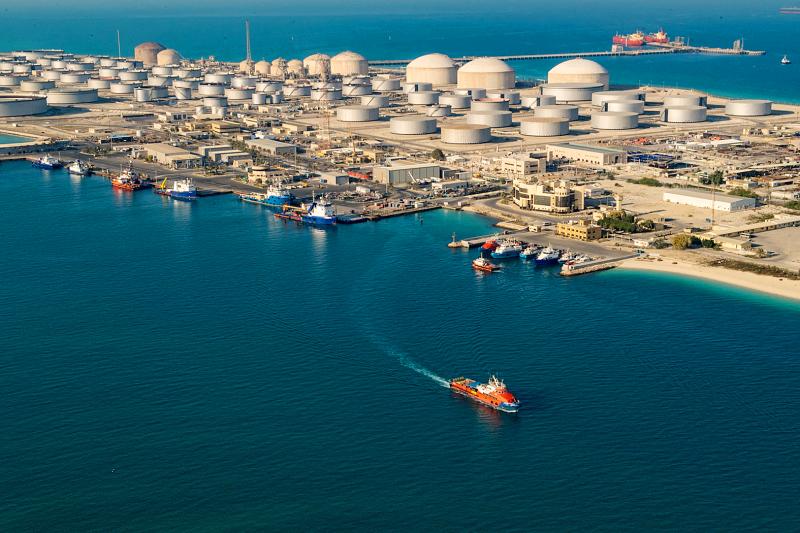OPEC and its allies have agreed to stick to their plan for gradual monthly oil production increases after a brief videoconference.
Ministers ratified the 400,000 barrel-a-day supply increase scheduled for next month after less than an hour of talks, one of the quickest meetings in recent memory and a stark contrast to drawn out negotiations in July.
While conditions might appear favorable for OPEC, there are uncertainties on the horizon. Even as demand recovers, it has been buffeted by the emergence of new SARS-CoV-2 variants. The question of whether Iran and the US will strike a deal to lift sanctions on the Islamic Republic’s oil exports — currently looking less likely — also hangs over the market.

Photo: AFP / HO / ARAMCO
West Texas Intermediate was 0.4 percent lower after closing little changed on Wednesday.
OPEC and its allies including Russia are in the process of rolling back the unprecedented output cuts implemented at the depths of the COVID-19 crisis last year.
About 45 percent of the idle supply has already been revived, and the group in July laid out a plan for gradually returning the remainder through September next year.
With crude prices mostly recovered from a slump in the middle of last month and the supply outlook relatively tight for the rest of the year, the 23-nation coalition had little reason to change the established schedule of gradual monthly supply increases, despite a request from the White House to revive output faster.
There had been some doubts about the plan when oil markets wobbled over the summer as the resurgent virus threatened demand.
However, fuel use proved resilient, with total oil products supplied in the US rising to a record late last month.
“While the effects of the Covid-19 pandemic continue to cast some uncertainty, market fundamentals have strengthened and OECD [Organisation for Economic Co-operation and Development] stocks continue to fall as the recovery accelerates,” OPEC+ said in a statement.
The group is to meet again on Oct. 4.
Data presented to ministers reveal a fresh challenge for Saudi Arabia and its partners next year.
Markets were projected to tip back into surplus next year, with an average oversupply of 1.6 million barrels a day.
However, the projections assume that the group would restore all of the almost 6 million barrels a day of output that remains offline — an unlikely feat as many countries might struggle to reach their full targets.
The amount of crude production that OPEC+ theoretically holds offline is based on questionable figures. Russia has an inflated baseline that is significantly higher than pre-COVID-19 pandemic output. Some other members have outdated capacity numbers, with countries including Angola and Nigeria already struggling to make the supply increases permitted under the deal.

To many, Tatu City on the outskirts of Nairobi looks like a success. The first city entirely built by a private company to be operational in east Africa, with about 25,000 people living and working there, it accounts for about two-thirds of all foreign investment in Kenya. Its low-tax status has attracted more than 100 businesses including Heineken, coffee brand Dormans, and the biggest call-center and cold-chain transport firms in the region. However, to some local politicians, Tatu City has looked more like a target for extortion. A parade of governors have demanded land worth millions of dollars in exchange

An Indonesian animated movie is smashing regional box office records and could be set for wider success as it prepares to open beyond the Southeast Asian archipelago’s silver screens. Jumbo — a film based on the adventures of main character, Don, a large orphaned Indonesian boy facing bullying at school — last month became the highest-grossing Southeast Asian animated film, raking in more than US$8 million. Released at the end of March to coincide with the Eid holidays after the Islamic fasting month of Ramadan, the movie has hit 8 million ticket sales, the third-highest in Indonesian cinema history, Film

Taiwan Semiconductor Manufacturing Co’s (TSMC, 台積電) revenue jumped 48 percent last month, underscoring how electronics firms scrambled to acquire essential components before global tariffs took effect. The main chipmaker for Apple Inc and Nvidia Corp reported monthly sales of NT$349.6 billion (US$11.6 billion). That compares with the average analysts’ estimate for a 38 percent rise in second-quarter revenue. US President Donald Trump’s trade war is prompting economists to retool GDP forecasts worldwide, casting doubt over the outlook for everything from iPhone demand to computing and datacenter construction. However, TSMC — a barometer for global tech spending given its central role in the

Alchip Technologies Ltd (世芯), an application-specific integrated circuit (ASIC) designer specializing in server chips, expects revenue to decline this year due to sagging demand for 5-nanometer artificial intelligence (AI) chips from a North America-based major customer, a company executive said yesterday. That would be the first contraction in revenue for Alchip as it has been enjoying strong revenue growth over the past few years, benefiting from cloud-service providers’ moves to reduce dependence on Nvidia Corp’s expensive AI chips by building their own AI accelerator by outsourcing chip design. The 5-nanometer chip was supposed to be a new growth engine as the lifecycle